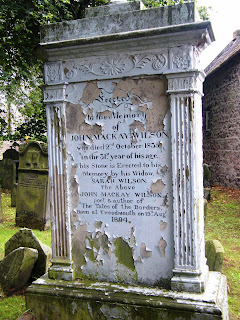Wilson’s Tales of the Borders was a series
of short stories, mostly traditional, published in serial form in Victorian
times. The weekly magazine proved hugely popular and later contributors
included Hugh Miller and David Moir who wrote as “Delta” in Blackwood’s Magazine.
John Mackay
Wilson was born in Tweedmouth, Berwick upon Tweed
and is buried there.
 |
| Wilson's neglected grave in Tweedmouth churchyard |
Years ago,
I came across an old copy of the Tales and thought some might be fashioned into
a series of plays, tied together by their location, following the Tweed from its
source to the sea. Nothing came of
the project at the time.
I was
invited to become involved in a re-appraisal of his work. There may be an attempt to dramatise “The Tales”.
http://www.wilsonstales.co.uk/
http://www.wilsonstales.co.uk/
With this new interest, I dusted off the old
scripts and went to look again at the places that inspired the stories.
A trip up
the romantic Yarrow valley to where the Megget Water flows into St Mary’s Loch,
found me revisiting the grave of Perce Cockburn, Laird of Henderland and border
reiver, executed by James V in 1530. His wife, Marjory, was buried beside him
in the ruined chapel on Chapel Knowe
 |
| Cockburn's grave |
The Border ballad “The Lament of the Border
Widow” is supposed to recall the events.
Tradition
has it that he was hanged from a tree at the door of his own castle and, as
such, it is recounted in “The Royal Raid” in Wilson’s Tales. In reality, Cockburn was beheaded in Edinburgh. The grave slab is a strange mixture of 13th
and 16th century carving, the lettering being that of the 1500s but the sword
and cross of a style common two hundred years earlier.
 | |||
| The slab is covered in moss and lichen but the sword is discernible on the left |
Maybe the
ballad has melded two events in the same way as the old stone has been re-used
to commemorate Cockburn and his wife.
Anyway, Wilson’s
version has more impact and pathos than the legalistic truth.
It makes
for more drama as Cockburn is dragged out and hanged at his own front door.
And clad it a' wi' a lilye flower,
A brawer bower ye ne'er did see,
Than my true love he built for me.
There came a man, by middle day,
He spied his sport and went away,
And brought the king that very night,
Who brake my bower, and slew my knight.
He slew my knight, to me so dear;
He slew my knight, and poined his gear;
My servants all for life did flee,
And left me in extremitie.
I sewed his sheet, making my mane;
I watched the corpse, myself alane;
I watched his body, night and day;
No living creature came that way.
I took his body on my back,
And whiles I gaed, and whiles I sat,
I digged a grave, and laid him in,
And happed him with the sod so green.
But think na ye my heart was sair,
When I laid the moul' on his yellow hair;
Think na ye my heart was wae,
When I turned about, away to gae?
Nae living man I'll love again,
Since that my lovely knight is slain;
Wi' ae lock of his yellow hair
I'll chain my heart for evermair.
Sparse, moving, honed by oral transmission, the verses contain not an extraneous word yet they deliver the brutal truth and harrowing emotion, precisely and perfectly.
It will be near impossible to follow it.

No comments:
Post a Comment